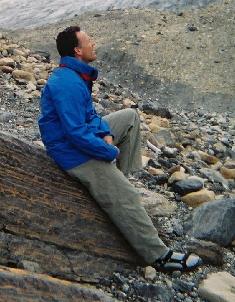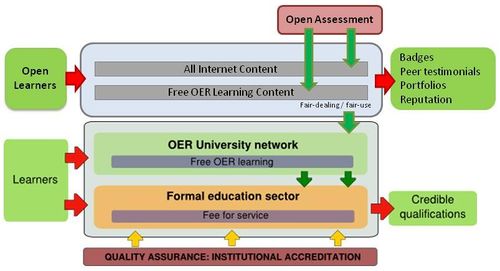Peter Rawsthorne, M.Ed IT, B.Tech
| Website: | http://www.rawsthorne.org | ||||
| Occupation: | Learning Systems Architect | ||||
| Other roles: | Instructional Designer; Enterprise Architect | ||||
| Nationality: | Canadian / UK | ||||
| Country: | Canada | ||||
| |||||
| |||||
I have a very strong belief in Open Educational Resources (OER) and their ability to assist in meeting the Millennium Development Goals (MDG). I am an educator with extensive experience in software development and in designing technical architectures to support strategy. The best way to get a sense of me is to visit my website; http://www.rawsthorne.org and if you want a sense of my views on development visit my rich media blog; http://criticaltechnology.blogspot.com.
Here is my vision for the tectonic shift.
Contents
How I can help
I believe their are three ways I could help in the development of OER;
- Team Lead / Technical Architect - taking the leadership / architect role in developing OpenSource software to support OER.
- Content Creation - creating learner centered content in the subject areas of;
- Web 2.0
- Education
- Computer Science
- Database Management
- Small Business
- Geography
- Outdoor Recreation.
- Rich Media Developer - using multimedia tools to create podcasts, online video and rich media web pages.
I will be developing content within the WikiEducator site within these areas of expertise, if you require assistance with your OER projects, do not hesitate to contact me; Peter Rawsthorne
My Projects
Open Assessment
I want to also offer another parallel dimension to support the OERu approach to assessment.
I believe their is an additional opportunity to create assessment instruments, tools and approaches that can work with the open assessment approaches being offered by OERu. This OERu reduced fee approach for assessment and qualifications is outstanding and an amazing offering to assist people around the world in achieving their educational goals. Having a fee for service assessment and qualification also creates a barrier to learning, assessment and credentialing. For fees will always be a barrier for the financially restrained. With current work around badges and peer assessment combined with mass collaboration we can also create assessment approaches that could be completely free and open and exist outside of the traditional educational environment being supported by OERu. I believe this additional dimension can support the work of OERu while also providing learners with alternatives for their assessment needs. They can also be used along side the OERu approach, and provide the learner with a greater number of tools to assess their learning and prepare for the assessment being offered by OERu. The approaches that make up Open Assessment include;
- Learner Assessment
- Rubrics
- Templates
- Use of massive assessment
- Small group and peer assessment
- Master - Apprenticeship Models
- Mass collaborative tools
To read more on my thoughts of Open Assessment go to my blog; http://criticaltechnology.blogspot.ca/2012/03/oer-assessment.html
K12 OER Development (Phase 2)
-
Set up IPS site on WikiEducator - Have 4 person groups choose subjects
Build OER
- Course templates
- Discuss Rubrics
- Discuss Assessment
- Formative
- Summative
- Build content
Quality Assurance and Review
-
Complete Readings / Research-
Commonwealth of Learning. (n.d.). Quality Assurance Micro-site. Retrieved on 19 May 2008 from http://www.col.org/colweb/site/pid/4225 -
Marshall, S. (2005). E-Learning Maturity Model. Retrieved on 19 May 2008 from http://www.utdc.vuw.ac.nz/research/emm/index.shtml
-
- Create Framework
-
Create Portal, which also becomes the project knowledge base - Mirror key components of eMM for reference and WE discussion
- Processes
- Dimensions
-
Contribution Levels- Draft - Single Author
- Draft - Collaborative Effort
- 2nd Draft
- Featured Work nomination
- Peer reviewed
-
- COL QA materials to featured items / framework
- eMM to featured items / framework
- Develop eMM competency levels
Permaculture
- My home permaculture garden on Bowen Island 1284 Oceanview Rd
- A shared project in rebuilding the farm on Grafton Rd.
Additional L4C Workshops
- May 2009
Hosting Migration (3 month duration)
See the migration project page for more detail
Mini-conferences
The purpose of these mini-conferences is to explore topics online and using the emerging do-it yourself "web 2.0" technologies. In the end these conferences are about community learning, collecting the collective knowledge of a subject, and encouraging interpersonal communications. The long-term benefit of these conferences is to have a rich-media record of the conference proceedings and artefacts.
Bowen Island online mini-conference(s)
- Web 2.0 Skills Development
- Municipal e-Government
Books I need to get from the library
- The White Man’s Burden: Why the West’s Efforts to Aid the Rest Have Done So Much Ill and So Little Good - William Easterly
- ICT4D: Information and Communication Technology for Development - Tim Unwin
- The Age of Unreason (Paperback) - Charles Handy
- Introduction To Permaculture (Paperback) - Bill Mollison
My Module Development
I've completed the development of Module Five (Database Management) of the Commonwealth Computer Navigator's Certificate
I continue the development of Module Three (Writer) of the Commonwealth Computer Navigator's Certificate
I've started to create some guidelines for the development of multimedia. I aspire for this to become a full course on authoring multimedia OER.
My WikiEducator Experiments
- An instantiation of some templates, so I can get a feel for these iDevices.
- How could a peer assessment iDevice be implemented within WikiEducator?
- How does the quiz template actually work?
- Is the full set of MediaWiki API's available on the WikiEducator site?
- Test a link to my contributions Special:Contributions/Prawstho
- Featured works review templates
My Multimedia Experiments
- Kaltura: <kaltura-widget kalturaid='qtv15chhjc' size='M' align='L'/>
My WikiEducator Promotions
- I'm teaching into my daughters grade 7 class, where I will be introducing Wiki's for learning and I will make considerable reference to WikiEducator.
- I responded to a question on Wikiversity regarding the use of wikis within secondary education. I suggested they use wikieducator as their deployment site.
- I'm involved in an OER course and find myself often referring to WikiEducator in comments I make to other students.
- Today (Tuesday 18 March 2008) was the first time I evangelized the benefits of WikiEducator on a discussion forum. It surprised me how committed I am to this project...
- I met with the Director and Assistant Director of Island Pacific School to discuss the idea of students developing K12 OER. They really liked the idea, so the journey begins.
- I am increasingly contacted from within my network about WE, I am more than happy to promote this project.
- K12 Student Generated Content projects gets some unexpected local media in the North Shore News
- Was interviewed by CBC's Todd Maffin for keynote regarding K12 use of technology. Mentioned the IPS / WE project.
My Research
- I wrote a paper called " Assessing the quality or open educational resource based wikis". Feel free to edit this paper...
- I've written a proposal for a graduate level program focused on creating and altering Open Educational Resources (OER). You can find the proposal as a pdf on the wikieducator site or at my website.
My Sandbox
{{subst:What a Brilliant Idea Barnstar|message Peter Rawsthorne 20:44, 6 March 2009 (UTC)}}
My Completed Projects
K12 OER Development (Phase 1)
- Network
- Contact SD45 - Deferred until after first K12 OER success (see IPS below)
-
Contact Administrators & Principal(s) - Email Administrators & Principal(s)
- Meet with Administrators & Principal(s)
- Create Statements of Work
-
- Contact Mulgrave - Deferred until after first K12 OER success (see IPS below)
-
Contact Principal -
Email Principal - Meet with Principal
- Create Statement of Work
-
-
Contact IPS-
Contact Principal -
Email Principal -
Meet with Principal -
Create IPS Statement of Work
-
- Contact SD45 - Deferred until after first K12 OER success (see IPS below)
-
Determine and Document Student Privacy Issues -
Facilitate a Learning4Content online workshop -
Re-work Learning4Content as Skills and Knowledge development workshop for Students and teachers-
Map to three 4 hour sessions - Due September 19th- Include Licensing and Intellectual Privacy
- Include Learning 2.0
- Create objectives, outcomes and time requirements
- Get feedback from Brad
- Publish to IPS Workshop Outline
-
-
Compose "What is WE? and why it matters to students!" document -
Begin a Student-Generated Content Node in WE -
Participate in workshop kick-off -
Facilitate workshop
CCNC Modules Enhancement (ON-HOLD)
- Module 3
- Continue Migrating ICDL content (with as little structural change as possible)
- Getting started with the writer application
- Main operations
- Formatting documents
- Adding tables, pictures, images and charts
- Mail merge
- Preparing to print
-
Use Template:ProjectNav and structure Module 3 to best print to pdf (see OER Handbook)
- Continue Migrating ICDL content (with as little structural change as possible)
- Multi Media Bounty and Extension
-
Complete bounty description -
Create sample treatment (storyboard)-
Consider CCNC MM Guidelines for development of treatment (storyboard) -
Review existing multimedia guidelines. -
Create /Treatment Guidelines that include media type, content, duration, other metadata, etc. -
Polish treatment with meaningful icons -
Review treatment with other contributors
-
-
Solicit contributors - Provide status report to contributors
-
Accomplishments -
Propose bounty award structure (solicit feedback) - Discuss potential project changes (make schedule an issue)
- Determine Multimedia standard(s) for reuse
- Resolve file format and size issue
- Next Steps
-
- Have Wayne put bounty contracts in place for;
- Solicit updated treatments
- Have expressed interest (awaiting finalized proposals)
- Request greater detail
- Evaluate proposals
- Manage project
-
Develop /Multimedia for Reuse Guidelines
-
Treatment -
Peer Review -
Media object creation -
Object publishing (with timelines) -
Completed Multimedia publishing -
Request to reuse
Privacy Policy
-
Author Privacy policy - Add statement of where responsibilities reside in relation to institutions with children contributing as OER authors.
- Add suggested approaches aligned with institutional policy
- Consent letters
- Teacher created and assigned user id's
- Shared institutional or project id's
- Add comment on reviewing national education policy
- Add suggested approaches aligned with institutional policy
Facilitate L4C Workshop
-
Complete expression of interest -
Send email to Wayne regarding my facilitating and L4C in early September -
Review workshop materials -
co-facilitate L4C workshop -
Make request to network for workshop participation -
Encourage IPS L4C to include > 15 participants -
Request additional facilitation -
Complete an additional two before December 2008

